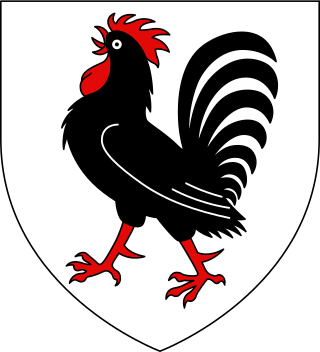
Dante Alighieri, most likely baptized Durante di Alighiero degli Alighieri and often referred to as Dante, was an Italian poet, writer, and philosopher. His Divine Comedy, originally called Comedìa and later christened Divina by Giovanni Boccaccio, is widely considered one of the most important poems of the Middle Ages and the greatest literary work in the Italian language.

The Divine Comedy is an Italian narrative poem by Dante Alighieri, begun c. 1308 and completed around 1321, shortly before the author's death. It is widely considered the pre-eminent work in Italian literature and one of the greatest works of Western literature. The poem's imaginative vision of the afterlife is representative of the medieval worldview as it existed in the Western Church by the 14th century. It helped establish the Tuscan language, in which it is written, as the standardized Italian language. It is divided into three parts: Inferno, Purgatorio, and Paradiso.

Mario Alberto Ettore Monicelli was an Italian film director and screenwriter, one of the masters of the commedia all'italiana. He was nominated six times for an Oscar, and received the Golden Lion for his career.

Francesco de Sanctis was a leading Italian literary critic and scholar of Italian language and literature during the 19th century.

Peppino De Filippo was an Italian actor.
Francesco Angiolieri, known as Cecco Angiolieri was an Italian poet.

Ghinotto di Tacco, called Ghino, was an outlaw and a popular hero in thirteenth century Italy. He was born in the latter half of the thirteenth century in La Fratta, which is now part of Sinalunga in the Province of Siena. Born the son of a Ghibelline nobleman Tacco di Ugolino and brother of Turino, he was a scion of the Cacciaconti Monacheschi Tolomei family.

Guglielmo della Porta was an Italian architect and sculptor of the late Renaissance or Mannerist period.

Ugolino Visconti, better known as Nino, was the Giudice of Gallura from 1275 or 1276 to his death. He was a son of Giovanni Visconti and grandson of Ugolino della Gherardesca. He was the first husband of Beatrice d'Este, daughter of Obizzo II d'Este. His symbol was a cock.
Giorgio Bàrberi Squarotti was an Italian academic, literary critic and poet. He taught at the University of Turin from 1967 until his death in 2017. He was considered to be one of the most important literary critics of his time.

Joannaof Gallura, also known as Giovanna Visconti, was the last titular Judge (giudicessa) of Gallura. Joanna claimed her rights in Sardinia to no avail and eventually sold them to her relatives, the Visconti of Milan, who later sold them to the Crown of Aragon. She is mentioned passingly by Dante Alighieri in the Divine Comedy. Her father, a friend of Dante's, but consigned to Purgatory with the other negligent rulers, asks her to be reminded of him.

The Delle Piane family is an old Genoese noble family first recorded in Polcevera in 1121. Over the past ten centuries it has produced many distinguished government officials, clerics, diplomats, soldiers and patrons.

Pietro Trifone, is an Italian linguist.

The House of Malaspina was a noble Italian family of Longobard origin that descended from Boniface I, through the Obertenghi line, that ruled Lunigiana from the 13th to the 14th centuries, and the marquisate of Massa and lordship of Carrara since the 14th century.

Conrad Malaspina, also known as L’Antico or The Old, was an Italian nobleman who lived in the 12th century. There is no certainty about Conrad's birthdate but most historians agree that it is around 1180, his death date is also uncertain but it is speculated to be around July 1254. Conrad was the forefather of the "Spino Secco" branch of the Malaspina family. Conrad Malaspina's achievements were of fundamental importance for the way Italian territories were shaped. He had very close relationships with Emperor Frederick II as well as many intellectuals and political figures of the time.

Opizzo Malaspina known as Opizzino was the forefather of the Spino Fiorito branch of the Malaspina Family.
Alagia Fieschi, also known as Alagia di Nicolò Fieschi and Alagia di Fieschi, was the daughter of Count Nicolò Fieschi and niece of Pope Adrian V. Alagia married Moroello Malaspina in the 1280s and they had five children. In Dante Alighieri's Divine Comedy, Alagia is remembered by Adrian V at the end of his conversation with Dante as the only virtuous woman in his family whom he wishes to pray on his behalf. Alagia’s mention as the only virtuous person in her family reflects Dante’s view about Alagia's family's actions involving the Malaspina family. In addition, Alagia is celebrated by Dante through his portrayal of her as a virtuous woman whose prayer can contribute to Adrian V's journey of salvation.

The Marquisate of Fosdinovo was a small fiefdom, led by a Marquess, that existed in the Italian peninsula between 1355 and 1797. It was based around Fosdinovo, a city east of La Spezia, and was ruled by the Malaspinas, a prominent Italian family, throughout its existence.
Francesco Cesare Casula is a Sardinian historian from Italy.
Michele Zanche was an Italian politician, best known as a character in Dante Alighieri's Divine Comedy, where he is mentioned in Canto XXII of Inferno, in the fifth bolgia of the eighth circle, among the barrators, together with Friar Gomita, vicar of Nino Visconti judge of Gallura. He married Simona Doria, from the famous and wealthy Genoese family.















